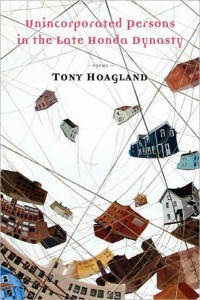Today in Scatterville we’re taken with Dwight Garner’s review in the New York Times of Tony Hoagland’s new book of poetry, Unincorporated Persons in the Late Honda Dynasty.
 For one thing, that’s just a terrific title, even better than the review’s zinger of a headline (based on a quoted poem set in a grocery store), The Free Verse Is in Aisle 3.
For one thing, that’s just a terrific title, even better than the review’s zinger of a headline (based on a quoted poem set in a grocery store), The Free Verse Is in Aisle 3.
Mostly, though, we’re happy that Mr. Hoagland has a new collection on (or in) the market, and that Mr. Garner has so cheerfully brought it to our attention.
The review draws comparisons in Hoagland’s poems to Randall Jarrell, Frank O’Hara, Marianne Moore. And we love the way that Garner fixes not just Hoagland’s poetry but an entire school in the firmament, in the process defining both what Mr. Hoagland is as a poet and what he is not:
“On a superficial level Mr. Hoagland’s poems — he writes in an alert, caffeinated, lightly accented free verse — resemble those of many writers in what one is tempted to call the Amiable School of American Poets, a group for which Billy Collins serves as both prom king and starting point guard. But Mr. Hoagland’s verse is consistently, and crucially, bloodied by a sense of menace and by straight talk.”
That makes Hoagland, in the Scatter Book of Literary Comparison, akin to the great John Updike, poet (in prose and verse) of suburban middle class unsettling awareness. Something growls, softly, beneath the placid surface. Think of that as you read these excerpts, from a poem set at a wine-tasting, that Garner quotes from Hoagland’s 2003 collection What Narcissism Means to Me:
But where is the Cabernet of rent checks and asthma medication?
Where is the Burgundy of orthopedic shoes?
Where is the Chablis of skinned knees and jelly sandwiches?
with the aftertaste of cruel Little League coaches?
and the undertone of rusty stationwagon? …When a beast is hurt it roars in incomprehension.
When a bird is hurt it huddles in its nest.
But when a man is hurt, he makes himself an expert.
Then he stands there with a glass in his hand staring into nothing
as if he was forming an opinion.